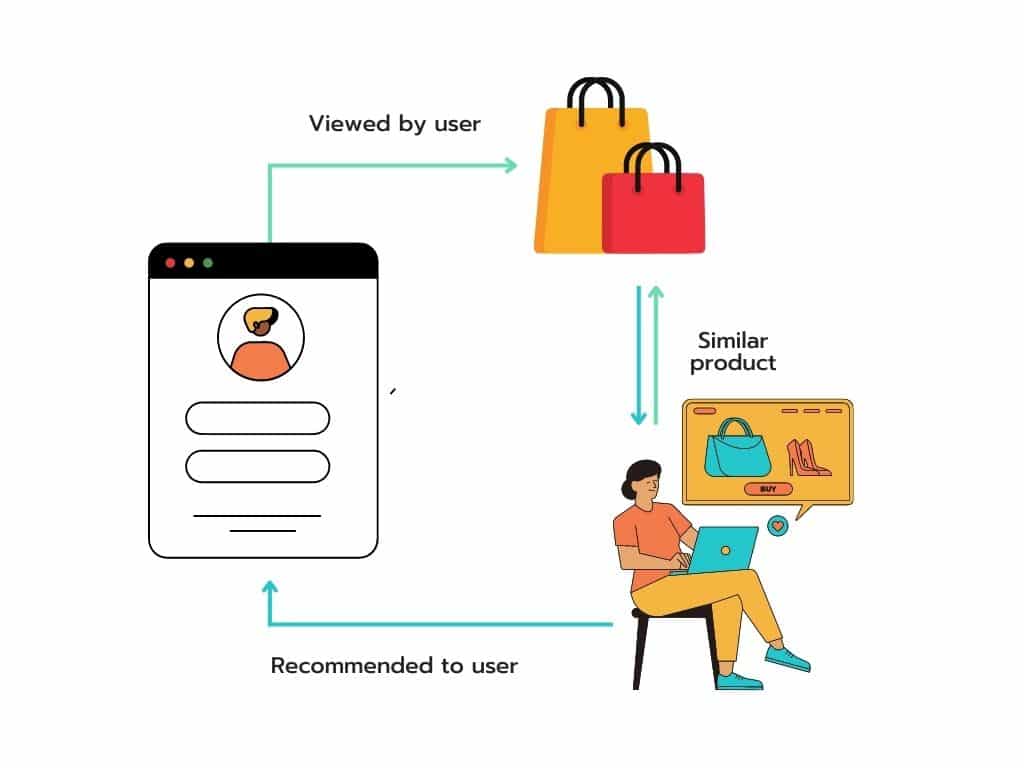Recommendation Systems in E-commerce: How It Works?
Did you know that 72% of customers claim to only interact with advertising messages that are personalized and customized to their interests, according to a SmarterHQ study?
Numerous companies, such as Alibaba, Netflix, Sephora, and Spotify, have been at the forefront of using recommendation systems to drive sales and customer engagement. These companies have effectively leveraged machine learning and data analytics to provide highly personalized customer experiences.
In this article, we’ll explore what is recommendation systems for e-commerce, why they are crucial in online markets, and showcase some real-world examples of how companies are leveraging these systems to stay ahead of the competition.
What is a recommendation engine for e-commerce?
Let’s begin with what is a recommendation system. A recommendation engine, also known as a recommendation system, for e-commerce is a software algorithm designed to provide personalized product recommendations to customers based on their browsing history, purchase behavior, and other relevant data.
Let’s say you are browsing an online clothing store and have added a few items to your shopping cart. The recommendation system for this e-commerce site might analyze your browsing and purchase history to suggest additional items that you may be interested in. For example, if you have previously purchased a jacket, the system might suggest similar jackets in different colors or styles that match your preferences.
These systems use machine learning and data analytics techniques to analyze large amounts of customer data and generate product recommendations that are tailored to individual customer preferences.
Why choose a product recommendation system
Recommendation engines have become increasingly popular in the e-commerce industry, allowing companies to provide personalized customer experiences and increase sales. By offering relevant product suggestions, companies can improve customer engagement and loyalty and drive additional revenue through cross-selling and upselling.

There are several reasons why companies choose to implement a product recommendation technique.
Boosting sales
By suggesting relevant items according to the customer’s interests and preferences, companies improve customer engagement, which leads to increased sales.
Lower bounce rate
If customers are presented with personalized product recommendations that match their preferences, they are more likely to stay on the website and explore more products, which can lead to a lower bounce rate.
Improved customer experience
A recommendation system helps improve the customer experience by providing personalized and relevant product suggestions. Customers are more likely to have a positive experience and feel valued when they receive tailored recommendations that match their preferences.
Competitive advantage
In today’s competitive e-commerce landscape, companies must differentiate themselves and stand out. A recommendation system can help companies offer a unique and personalized shopping experience that differentiates them from their competitors.
Better inventory management
A recommendation system can help companies better manage their inventory by suggesting products that are in stock and eliminating recommendations for out-of-stock or low-margin items.
Cost-effective marketing
Recommendation systems can also be a cost-effective marketing strategy. By suggesting relevant products to customers, companies can promote additional items and increase the average order value without spending extra money on advertising or marketing campaigns.
Amazing recommendation engine examples
Recommendation systems can positively impact various KPIs in e-commerce companies by increasing sales, improving the customer experience, and providing cost-effective marketing strategies. Here are some amazing recommendation engine examples:
Pandora
Pandora is a streaming music service. First introduced as an internet radio service to consumers, the service would create tailored channels based on the user’s preferences in music. Its recommendation engine suggests songs to users based on their listening history and preferences, as well as other factors like the user’s location and time of day. According to Business of Apps, Pandora has over 50 million active listeners each month.
You are most likely familiar with LinkedIn, the world-leading professional network with over 900 million users across 200 countries. LinkedIn’s recommendation engine suggests job opportunities to users based on their skills, work history, and other factors. According to LinkedIn, its recommendation engine is responsible for 65% of all job applications on its platform.
Goodreads
If you enjoy reading, then you probably use Goodreads, the largest website in the world for book suggestions and readers. Its goal is to assist readers in discovering and discussing their favorite books. Goodreads’ recommendation engine suggests books to users based on their reading history, ratings, and other factors. In a survey conducted by Goodreads in 2020, 90% of users reported that the platform had helped them discover new books.
Zillow
Zillow – an American online real estate marketplace. Zillow’s recommendation engine suggests homes to users based on their search history, preferences, and other factors like location and price range. As of Q4 2022, Zillow reported having over 198 million monthly unique users on its platforms.
Future of recommendation systems in e-commerce
Based on various statistics, it is clear that recommendation systems in e-commerce have been highly successful and are expected to continue to evolve and improve.
For instance, according to a report by Barilliance, personalized producer recommendations account for 31% of e-commerce site revenues. In a survey of 400 e-commerce companies conducted by Nosto, 91% reported that personalized recommendations had a positive impact on their revenue.
These statistics highlight the importance and effectiveness of recommendation systems in e-commerce, as they can significantly impact revenue, customer loyalty, and overall user experience.
We expect to see more sophisticated recommendation algorithms integrating various data types, including contextual information and user behavior, to provide more relevant and timely recommendations. Additionally, explainable recommendation systems will become increasingly important as users demand more transparency and accountability from the recommendations they receive.
Hybrid and interactive recommendation systems will also continue to evolve, allowing for more customized and engaging user experiences. Integrating augmented reality and virtual reality technologies into e-commerce platforms could create new possibilities for immersive and personalized recommendations. All in all, the future of recommendation systems in e-commerce is likely to be shaped by a continued focus on improving the accuracy, relevance, and user experience of recommendations.






